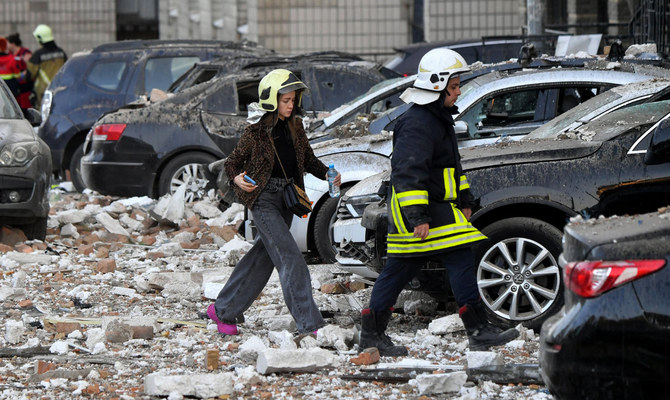
The missile strike last week in Poland that killed two Polish citizens created a sharp intake of breath from Europeans, by highlighting how Russia’s war on Ukraine risks spiralling into a conflict of ever greater devastating and widespread consequences.
While the Western alliance waited for evidence of who was responsible, and prayed that this would not escalate into discussions about triggering Article 5 of the North Atlantic Treaty, under which NATO members are committed to come to the defense of any member that is under attack, Ukraine’s President Volodomyr Zelensky was quick to accuse Russia. Despite indications that the strike was an accident caused by aUkrainian air-defense missile, Zelensky maintained that this was a Russian attack, and further evidence that Russia was prepared to do whatever it takes to tear Western Europe apart.
Zelensky’s kneejerk reaction that Russia was responsible for attacking a NATO member betrayed his own frustrations. Since the start of Russia’s invasion, his pleas for NATO to impose a no-fly zone over Ukraine have gone unheeded. But it is critical that Zelensky maintains the high ground and keeps Ukrainians fixed in Western minds as the good guys in this war against Russian aggression.
Muddying the clarity of what is still seen in the West as a black-and-white conflict into the grey zone of a conflict in which disinformation and, ultimately, brutality are committed by both sides, risks falling into Russia’s narrative trap, which uses false-flag tactics and disinformation to paint Ukraine as a country of terrorists intent on destabilizing Russia.
Zelensky is balancing on a high wire. Any sign that he is keen to draw the West further into the conflict will be leveraged by opponents of the war in Europe and the US, who will blame him for further escalation. Zelensky’s most precious asset is the trust the Western-led international community has placed in him. Automatic blaming of Russia or reluctance to accept the facts based on outside intelligence will seed creeping suspicions that Ukraine too is conducting its own false-flag operations and manipulating the truth.
This will allow Russian President Vladimir Putin to draw further parallels of moral equivalence: for example, that Kyiv has been depriving millions of Russian speakers of their rights; or that Ukrainian shelling of Russian forces in Sebastopol requires Russia to counter this unprovoked threat to its territorial sovereignty; even that it would give Russia the right to deploy nuclear weapons in response.
Zelensky’s priority right now is to de-incentivize growing calls from Western critics who are looking for ways out of an expensive, protracted, and dangerous conflict, and think now is the time to seek a mediated solution.
Zelensky’s most precious asset is the trust the Western-led international community has placed in him.
Trisha de Borchgrave
Zelensky must also avoid making it easier for Russia to obtain continued support from those many non-Western countries — across Asia, Latin America, the Middle East and Africa, as well as China — that haven’t joined in imposing sanctions against Russia. These tend to sympathize with the idea that US-led NATO enlargement constitutes a security threat on Russia’s borders, just as Americans felt that the presence of Russian nuclear weapons on the island of Cuba in the 1960s threatened their own security.
These “neutral” countries have not fallen into line with the Western view that it is Russia that poses the threat to international order. Nor have they forgotten America’s elective process of foreign policy intervention in countries that posed no direct threat to it, such as Libya and Iraq, but that nevertheless stopped short in Syria. Past US hypocrisy has engendered an era in which “Whose order?” is a common response by the anti-sanctions coalition.
These countries that choose to hedge their bets, based on the realities of their own geographies, also represent Russia’s new economy. Not only have they not joined in imposing sanctions, they have also increased their imports of Russian goods, including fertilizers, minerals and crude oil, while in some cases creating new havens for the luxury lifestyles of Russian oligarchs.
It is an impossibly difficult situation for Zelensky — who, in Star Wars parlance, must continue to represent the embattled Federation against the forces of the evil Empire. As the saying goes, the stakes couldn’t be higher. The outcome of the war will determine not only Ukraine’s ability to rebuild itself as an independent democracy inside the EU, but also the shape of security for all Europeans for generations to come.
Europe wants to be on the right side of history, not just for its persistence as a continent of allied democracies, but for the sake of its own identity. Europeans look to Ukrainians’ un-daunting courage and unstinting self-belief in their right to unshackle themselves from Russian domination and the rot of Soviet-era corruption, to carve their own path to self-determination. They see in Ukraine the flame that they hope still burns inside them: the will to fight with their dying breath to defend their own democratic freedoms.
Zelensky must use every fiber in his body to sustain this Western support, by maintaining its trust, by keeping Ukraine honest and accountable even in the face of unspeakable horror to its people, so that it can, as is freely possible, decide when and where this all ends.
• Trisha de Borchgrave writes for print and online media and is based in the UK.
Twitter: @TrishadeB












